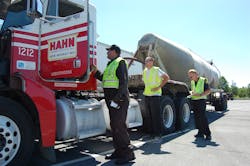FMSCA aiming to assign fault for crash causation
Next summer, the Federal Motor Carrier Safety Administration (FMSCA) is slated to release the results of its newly launched “comprehensive analysis” of commercial-vehicle accident accountability.
The agency has stated that its Compliance, Safety, Accountability (CSA)rule seeks “to identify motor carrier safety problems earlier through better use of data, with the end goal of reducing crashes, injuries, and fatalities.” With that charge in mind, FMCSA has initiated what it terms “crash-weighting research.”
This effort was further described by the agency as “a focused initiative to analyze a process for updating the 100,000 annual State-reported crash records to include a determination of a motor carrier’s role in a crash.”
Currently under CSA, there is no mechanism for publicly ranking a given motor carrier’s crash- risk. The viewable data now only points to crash involvement-- with no indication of who’s at fault in a crash.
Earlier this year, FMCSA issued a statement regarding establishing crash accountability. “FMCSA is committed to a robust, data-driven Compliance, Safety, Accountability (CSA)
program that effectively identifies commercial truck and bus companies that pose a greater risk for crashes on our roadways,” the statement read.
“As part of the CSA program, FMCSA considered developing a crash accountability initiative that would examine the responsibility associated with crashes involving commercial motor vehicles,” the agency continued. “…FMCSA identified several critical areas that require further study. They include establishing a uniform process for making crash determinations, reviewing police accident reports and ensuring public input in the development process. As a result, FMCSA will continue to thoroughly examine these issues as it sharpens CSA as a safety enforcement tool.”
Fast forward to this week when FMSCA pointed out that “the crash reports submitted by the States do not include a determination of whether the motor carrier is responsible for causing the crash. Analysis shows that the current process of including all crashes a motor carrier is involved in is a good predictor of future crash risk.”
Nonetheless, the agency went on to say it “recognizes that additional crash data might further sharpen the ability of the SMS [within CSA]to identify carriers that pose the highest risk.”
The upshot of that is FMCSA is conducting a “comprehensive analysis” that will include these “key steps”:
- A broad study of PARs [Police Account Reports]across the country “will attempt to determine whether they provide sufficient, consistent, and reliable information that can be used to determine the carrier’s role in a given crash and what other information, including input from other entities in the outcome of a crash determination, should be used to supplement PARs for maximum reliability.”
- FMCSA will conduct analysis to determine if the carrier’s role in a given crash is a “better indicator of future crash risk.” If so, the analysis will determine the impact of weighting crashes differently in SMS.
- Throughout this analysis, research will also be reviewed from similar programs in other countries (e.g., Canada) to understand their analysis, processes, and applicability to SMS.
FMSCA said the results of its study will be available “in the summer of 2013.” And, per the results, “FMCSA will develop the Agency’s plan forward for determining a carrier’s role in a crash and the potential use of this new information in the Agency’s safety programs-- including SMS.”
“We appreciate FMCSA responding to ATA's request to disclose a timeline for a crash accountability process, American Trucking Assns.(ATA) spokesperson Sean McNally told FleetOwner.
“In the near term,” McNally continued, “FMCSA can and should weight within CSA the crashes for which there's little or no analysis needed. These types of crashes are well known and well understood by all those involved. We also appreciate FMCSA's recent decision to make two CSA-related reports, one from 2008 and one from 2010, available to the public,” he added.
David Heller, director of safety and policy for the Truckload Carriers Assn. (TCA), told FleetOwner that “TCA’s point of view [on FMCSA crash-weighting research] is it’s a good thing. Many carriers now are getting the short end of the stick with accidents that are not their fault being counting against them.
“[The current CSA approach] does not paint the truest picture of what actually happened in a given accident,” he continued. “FMCSA is now headed toward a better telling of what each accident was about and who truly was at fault.”
Heller noted that American Automobile Assn. (AAA) data shows that the majority of truck-car crashes are caused not by the truck, but by the passenger vehicle. “That is not now distinguished in the scoring of [CSA] data,” he added.
To view a white paper on ATA’s top concerns with the CSA program, click here.
